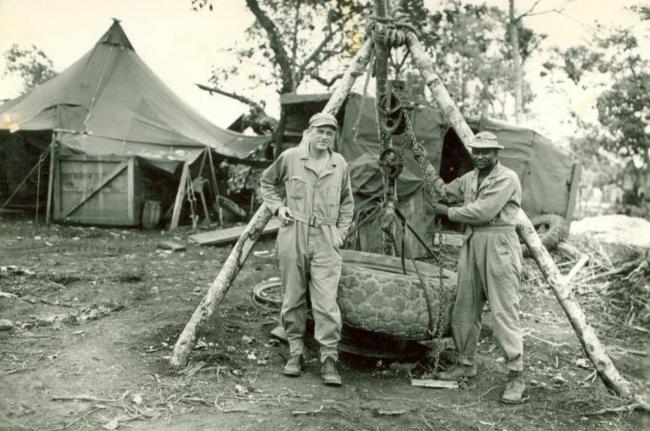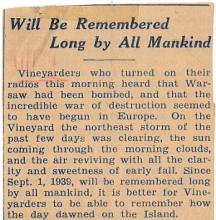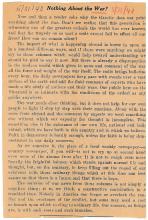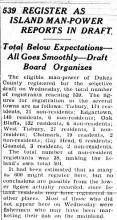The Japanese attack on Pearl Harbor, on Dec. 7, 1941, is a landmark in the life of this nation, by which we judge where we are and where we were. The moment the news came over the radio that Sunday afternoon, it caught a nation in one instant like some great group photograph.
Fifty years have passed, and now we look back to pay homage to those who offered their lives and energies to fight fascism and imperialism, and to re-examine a symbolic moment in history.
The news caught the Island in the middle of a cold snap. As in all winters the scallopers were scalloping and the stores were preparing for Christmas. The news posed an interesting quandary for former Vineyard Gazette editor Henry Beetle Hough, who once wrote: "The Gazette does not seek to maintain a barrier against events at large, but merely to sift out and select Island relationships. The more completely a major event is reported elsewhere, the less likely it is to merit coverage in the Gazette - unless there is some special Island impact, or Vineyard personalities are concerned, or some direct source of information is open."
In that December 50 years ago this community had already said goodbye to native sons. When the bombs fell in Hawaii, Dayton Eddy of Vineyard Haven was in the Pacific, as was Richard Thompson of Vineyard Haven. Joseph Gomes Camacho of Oak Bluffs was in the Army stationed in Hawaii, as were Charles Rubinacci and Cecil Grant of Edgartown. Wyman Mortimer of Edgartown was in an Army transport in the Pacific and wired news of his safe arrival days after the bombing, the Gazette reported. John Campbell, a summer resident of Oak Bluffs, was shot down in a British Spitfire on the first day of the American war, Dec. 7, 1941.
General William P. Ennis, civilian defense chief for the Island, was quoted in the Friday, Dec. 12 edition - the first paper after the attack - advising people:
"I cannot visualize any enemy making a landing on Martha's Vineyard either from the air or the sea, as it would be of no assistance to them in any operation on the mainland."
Still the paper went about its business of reporting the week's local news. Mingled with advice about air raids signals and blackouts was a front page story about the chicken and sheep populations on the recently deserted Noman's Land. Another item reported that F.A. Paris' lamb took first place in the International Livestock Exposition in Chicago.
Elsewhere on the front page was this news:
"Oak Bluffs reports the first nomination papers taken out for the annual town election. Two candidates for park commissioner, Herbert Combra and Albert R. Clements, have filed their papers. Neither has previously held office."
On Tuesday after the bombing the air raid alarm sounded across the Island, and there were reports of Japanese Zeros over East Chop. The Gazette editorial was stern that Friday:
"Most of the fears of the past few days have been the result of absurd rumors such as the story that the Japanese insignia was seen on a plane over the Island. Don't believe such rumors, act only on reliable information and the rest of the time live normally and usefully. Moreover, don't start or spread spy stories about your neighbors. Authors of scandalous reports should be answerable in court."
Another item in that paper of Dec. 12, 1941, reported on the readiness of Island reservists:
"The Eighteenth Company, State Guard Reserve of Oak Bluffs was on guard Tuesday when the alarm sounded, stationed at vital points in town, one at the water works, one at town hall and one at the hospital.
"Elsewhere 14 replacements are needed for signal corps detachment at Peaked Hill and for the 24 hour airplane observation post in East Chop, according to Chief Observer Rodney D. Marks."
Robert T. Morgan Sr. of Edgartown remembers he was hanging out in a Vineyard Haven coffee shop with friends that December afternoon.
"Ken Grant had a V-8 Ford with a Racer body. Ken and I drove over to Vineyard Haven to a coffee shop – that's when we heard of Pearl Harbor that day. Not too long after that John and Ed Kelly, Al West, Neil Sibley and I all headed up to Boston to enlist,” Mr. Morgan recalled this week.
Elmer Santos was riding around when he heard the news on the car radio. He joined up a year later and spent three years in the Pacific aboard the cruiser Baltimore.
"I didn't see too much, I was below decks most of the time," he remembers.
Later that historic December, the Gazette had this news:
"St. Petersburg, Fla., papers of Tuesday describe the seizure of stocks and cash of the Japanese stores and other business establishments of that city. Among the places listed as seized and closed, was the shop of Mr. and Mrs. T. Sone, who operate "Sone's" in Oak Bluffs each summer. Mrs. Sone, who was born Aiki Miyanaga in Oak Bluffs, was not placed under such restrictions as her husband. The Island people as a whole are regretful to hear of their bad fortune."
Many Vineyard residents intervened and the Sones were later allowed to reopen their Florida store, but they were restricted to the city of St. Petersburg for the duration of the war and never reopened their Circuit avenue shop. Mrs. Sone wrote to the Gazette in 1942:
"When one considers the treacherous and shameful way the government of Japan has acted, you good folks have been more than kind and truly Christian in your dealing with the Japanese here. In what country but America would each individual stop to realize what we are born is God's will and not our own?"
Some things have changed little. Another editorial in December of 1941 noted:
"Someone in Hawaii was the author of a statement in which he expressed the fear that the Japanese assault would be thought greater than it actually was, and that tourists might on that account be deterred from visiting Hawaii."
The Vineyard collected razor blades and clothing and old tires for the war effort. Young men and women joined up or worked for the Red Cross, even as one small community went on with the little matters that occupy the Island still.
As the war progressed in the Pacific and in Europe, the Vineyard, like communities across America, sacrificed children to the battle for freedom. Now 50 years have passed and we pause to contemplate the meaning of that struggle.











Comments